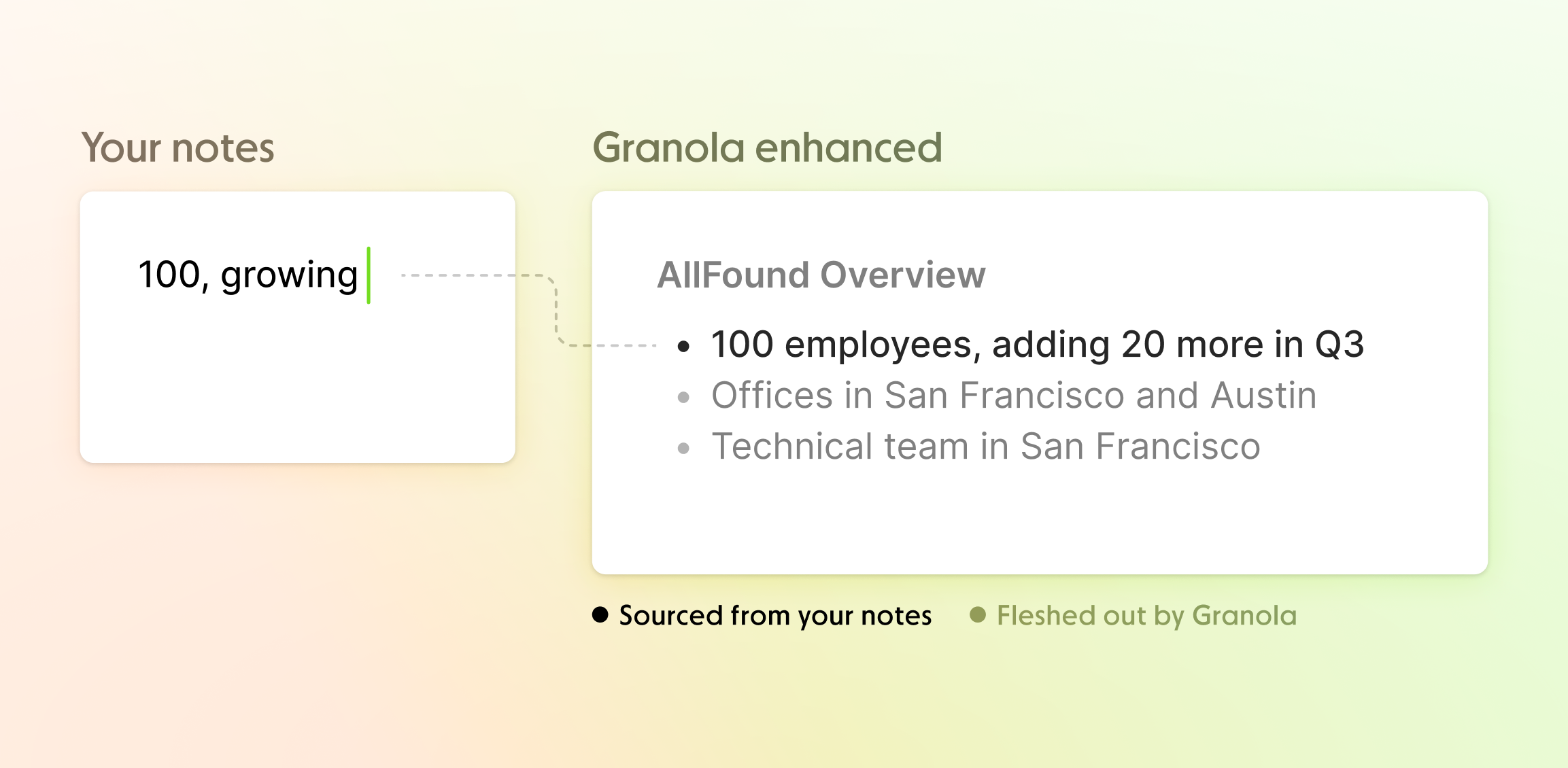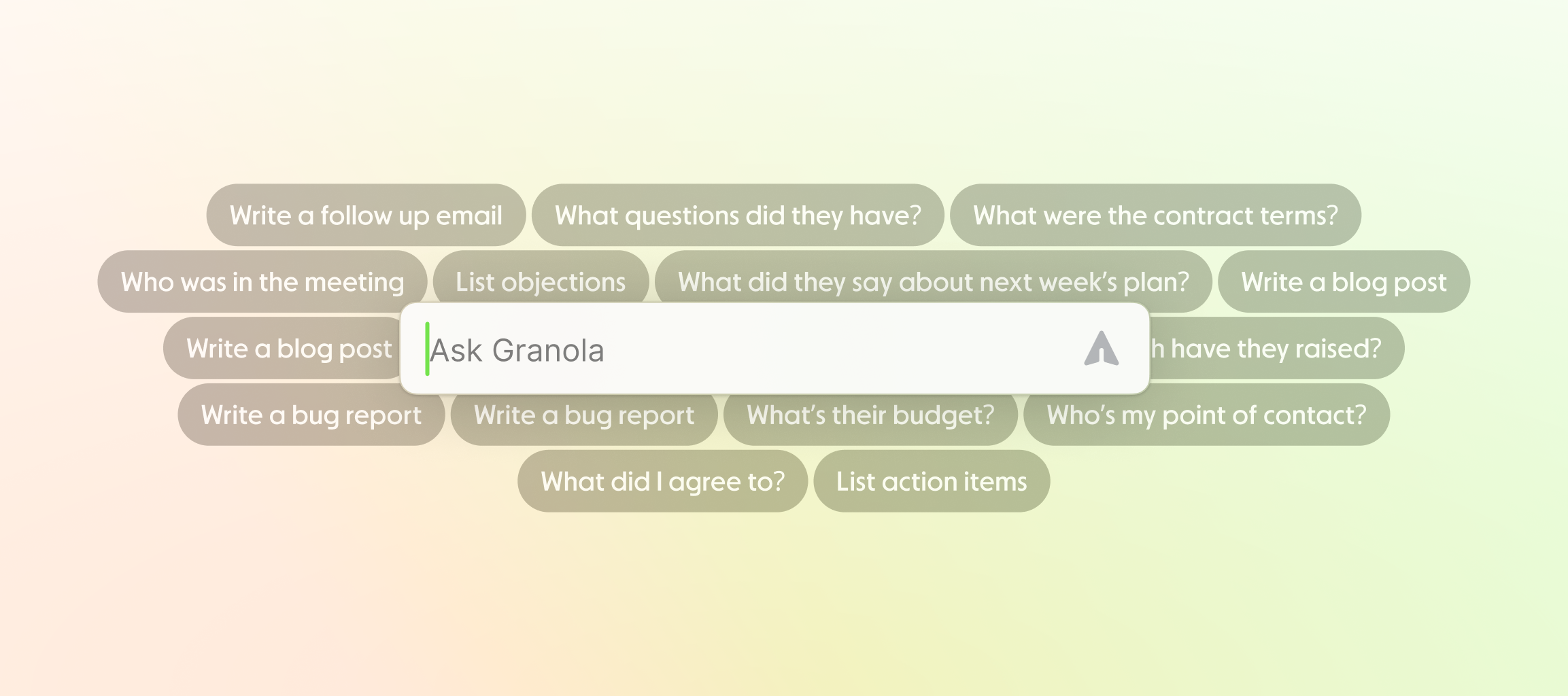Our team has been obsessed with building AI-native products for a while. At our previous startup, Socratic, we used AI to help millions of students learn.
For the last couple years, we've been thinking about how AI can help us work better. And today, we are excited to announce our new product, Granola.
Granola is a deceptively simple notepad for meetings. It works like a regular notepad, except that it also listens to your meeting. When the meeting ends, it uses whatever notes you've written, plus whatever it's heard, to write you fantastic notes.
To do this, Granola analyzes who is in the meeting, what their roles are, and what you're trying to achieve. It understands that you care about different things in a job interview, sales call or investor pitch, and it structures your notes accordingly.
And unlike all the AI meeting bots out there, Granola notes are still your notes: Granola starts with what you've written, cleans it up and fleshes it out. This means you end up with notes that you can trust and other people can understand, with a fraction of the effort.
A steering wheel for LLMs
Using LLM products today feels a lot like using early cars in the 1800s: clearly magical, clearly going to change the world, and really hard to drive.
The first cars didn't have steering wheels (they hadn't been invented yet), so you'd steer them with a big lever called a tiller. The problem with tillers is that they are imprecise, which made driving impractical and dangerous.
LLM products today feel the same. Their ability to write text is magical, but we don't yet have the fine-grain controls necessary for many real-world tasks. For example, chatGPT can write an email in seconds. But getting it to write an email that sounds like me takes so much back-and-forth that it's not worth the effort.
AI meeting summaries have the same problem: they feel generic and often don't capture what you care about. So we asked ourselves: what's the most intuitive way AI can help you write notes while keeping you in the driver's seat?
To answer that question, we invented a new way of writing notes.
A new way of writing notes
Before Granola, the point of writing notes was to capture information. In Granola, the point of writing notes is to point the AI at what's important.
First off, you don't need to write a thing. If you want to focus on being present in the meeting, that's fine. Granola will use all its context to write the best notes it can.
But, if something important comes up and you want to make sure it's captured, jot it down. Don't worry about typos or writing in full sentences, Granola will clean it up for you.
Granola also adds hierarchy and structure to make your notes easier to read. Like having your notes in a specific format? No problem, just add headers to your notes and Granola will flesh them out for you.
Because AI doesn't always get stuff right, it's important to know what came from you vs what came from the AI. Granola makes it easy: everything from you is in black, everything else is in gray.

If you ever want to understand where a note came from (and double check that the AI got it right), click on the "Zoom In" button. Granola will show you the exact quotes the note is based on.
Lastly, Granola has OpenAI's GPT4o built into it. That means you can ask it to do the same things you'd ask ChatGPT, but Granola has the benefit of having the full context and transcript of your meeting.

Our tools matter
We shape our tools and, thereafter, our tools shape us. ~ John Culkin
The way we incorporate AI into our tools matters. If we are not careful, as a society we may accidentally outsource not just our busywork, but our judgment to LLMs.
We all reach for tools that save us time. But used incorrectly, AI saves us time at the expense of thoughtfulness. If you had chatGPT write all your emails and a meeting bot write all your notes, you would get your work done faster, but you'd be doing a terrible job.
At Granola, our mission is to build tools that elevate you to do your best work. We want your relationship with AI to be that of a conductor conducting an orchestra. We see a future where AI augments your abilities in incredible ways, while always keeping you in control.
Our launch today is our first step, of many, towards that future.
Chris Pedregal, Cofounder & CEO